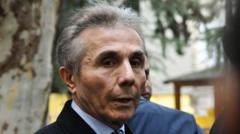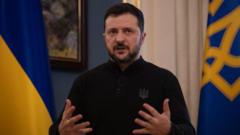The death of Aleksei Navalny in February 2024 marked a significant blow to the Russian opposition movement, yet the Kremlin's actions against his supporters have intensified. Despite the absence of Navalny, authorities aggressively target individuals connected to him, illustrating the regime's fear of his enduring influence.
The Legacy of Navalny: Continued Suppression of Opposition in Russia

The Legacy of Navalny: Continued Suppression of Opposition in Russia
A year after the death of Aleksei Navalny, Russian authorities remain relentless in their crackdown on dissent associated with the opposition leader.
In the aftermath of Aleksei A. Navalny's death inside a Russian prison, authorities in Moscow have intensified their crackdown on dissent, revisiting past affiliations with the late opposition leader as a means to suppress any lingering resistance to the Kremlin. This crackdown was starkly illustrated when Konstantin A. Kotov woke up to find his apartment surrounded by Russian officers, who proceeded to seize various items connected to Navalny’s legacy, including campaign memorabilia and literature. Kotov's alleged crime? Donating a mere $30 to Navalny's Anti-Corruption Fund, which the state has labeled as extremist.
Navalny, whose activism once mobilized thousands against President Vladimir V. Putin’s regime, has left a power vacuum within the opposition following his death in February 2024. While many of his supporters have sought refuge outside of Russia amid an escalating crackdown on dissent initiated before the onset of the Ukraine war, the Kremlin has shown that it remains vigilant.
This unyielding pursuit of individuals associated with Navalny is viewed by some observers as a manifestation of a repressive system functioning on autopilot. Others argue that it is indicative of a deeper-seated paranoia within the Russian government, fearing that Navalny's impact and ideology might inspire a resurgence of dissent, even in his absence. Sergei S. Smirnov, the editor of the exiled outlet Mediazona, suggests that the ongoing prosecutions may arise more from routine repression than coordinated campaigns.
As the opposition grapples with its fragmented state, the Kremlin's continued actions against Navalny's supporters reveal the lengths to which authorities are willing to go to maintain control and silence dissenting voices within Russia.
Navalny, whose activism once mobilized thousands against President Vladimir V. Putin’s regime, has left a power vacuum within the opposition following his death in February 2024. While many of his supporters have sought refuge outside of Russia amid an escalating crackdown on dissent initiated before the onset of the Ukraine war, the Kremlin has shown that it remains vigilant.
This unyielding pursuit of individuals associated with Navalny is viewed by some observers as a manifestation of a repressive system functioning on autopilot. Others argue that it is indicative of a deeper-seated paranoia within the Russian government, fearing that Navalny's impact and ideology might inspire a resurgence of dissent, even in his absence. Sergei S. Smirnov, the editor of the exiled outlet Mediazona, suggests that the ongoing prosecutions may arise more from routine repression than coordinated campaigns.
As the opposition grapples with its fragmented state, the Kremlin's continued actions against Navalny's supporters reveal the lengths to which authorities are willing to go to maintain control and silence dissenting voices within Russia.























